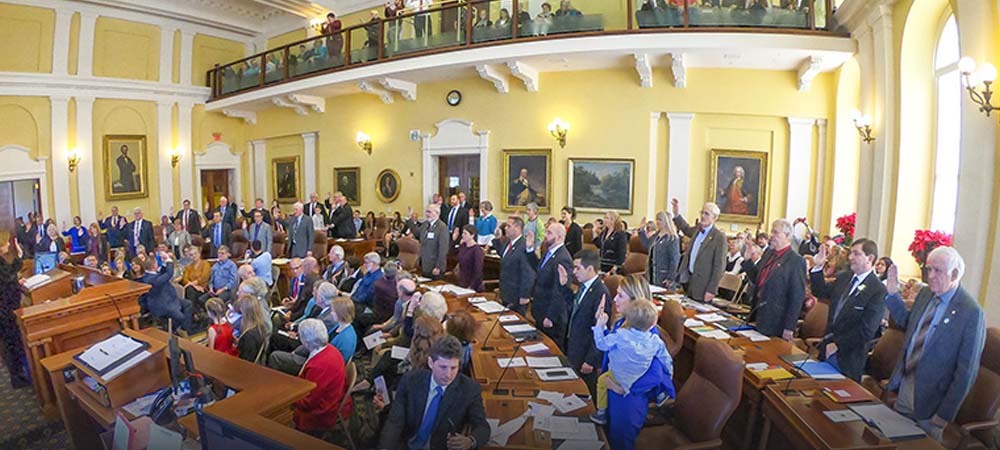- Maine’s LD 1626 – a comprehensive bill reanalyzing Maine’s tribal relations – is scheduled for a public Judiciary Committee hearing on February 15.
- The bill would leave the door open for tribes to offer sports betting; Gov. Mills’ administration is a notable opponent, though they are in the process of creating their own sports betting proposal.
AUGUSTA, Maine – Maine’s LD 1626 (officially titled “An Act Implementing the Recommendations of the Task Force on Changes to the Maine Indian Land Claims Implementing Act”) – a bill that would reform several aspects of Maine’s relations with its native tribes – could have a considerable impact on Maine’s gaming industry.
LD 1626 – The Latest Chapter In Maine’s Sports Betting Saga
The bill is a comprehensive reexamination of Maine’s tribal relations. While the bill does not explicitly outline any sports betting provisions, it could leave the door open for tribes to offer their own sportsbook.
It is scheduled for a public hearing in the Judiciary Committee on February 15. One of the most important things LD 1626 would accomplish is the official recognition of several tribes which are not currently recognized by the government.
This could enable tribes to offer sports betting under the Indian Gaming Regulatory Act if the bill is successful.
Four Wabanaki-affiliated tribes – the Penobscot Nation, the Aroostook Band of Micmacs, the Passamaquoddy Tribe, and the Houlton Band of Maliseet Indians – officially support the legislation, with an additional 100 organizations backing the bill as well.
Supporters of the bill say that federal recognition would put the tribes on equal ground with other federally-recognized tribal entities.
The Wabanaki Alliance, a group formed by the four tribes, says that proposal “would take tremendous steps to ensure that the Wabanaki tribes are generally treated like all other federally recognized tribes”.
Office Of The Governor Pens Op-Ed Against Bill
However, not everyone in Maine is on board with LD 1626. In early February, Jerry Reid – Chief Legal Counsel for Governor Mills – penned an op-ed in the Bangor Daily News. In it, Reid describes his administration’s stated commitment to improved Native American relations; however, he also claims to be apprehensive about the expansive nature of the bill.
“LD 1626 is a complicated bill that would rewrite much of the state law implementing Maine’s 1980 Indian Land Claims Settlement, and we are concerned that some of the legislation’s broadly written provisions would lead to new legal disputes over their meaning and effect at a time when we are working so hard to improve relations,” said Reid.
Reid says three aspects of Native American relations could be addressed: taxation, institutional structure, and gaming.
He says that the legislature is working on new legislative language that would address these issues without the passage of the expansive LD 1626.
The gaming aspect is of most interest to sports bettors of Maine and would likely have the greatest financial impact of the potential avenues Reid mentioned.
Sports Betting Among Options For Improved Tribal Relations
This is good news for Maine’s sports bettors, who have remained without any form of state-regulated sports betting even while over half of the United States offer legal sports betting in some way.
The even better news is the indication that lawmakers are considering tribal-run online sports betting as a potentially feasible avenue.
Often, if a state’s sports betting market is limited to tribal-only, the only form of regulated sports betting available are land-based sportsbooks – some jurisdictions allow tribes to operate online sportsbooks, but most require users to be physically located on tribal lands to utilize them.
However, Reid did not mention any potential geographic restrictions, so he may envision a more typical online sports betting industry, strictly run by tribal entities.
The sports betting bill Reid mentioned, LD 1352, would regulate sports betting in Maine through both commercial and tribal operators. The bill was carried over to the current legislative session and currently awaits further action in the Senate.
Not If, But When
While tribal-only online sports betting market would certainly be welcome in Maine, it would also limit the number of potential sportsbooks available to bettors – this would limit competition, leading to a less desirable market than a tribal-and-commercial setup.
While it seems LD 1626’s future is in doubt considering the Governor’s historic and stated opposition to the bill, it also seems that progress is being made on the sports betting front.
In 2020, Governor Janet Mills vetoed the sports betting bill LD 553, after it passed both the House of Representatives and the Senate.
For the next two years, lawmakers, tribal representatives, and Governor Mills debated revisiting Maine’s 1980 Indian Claims Settlement Act, which is unique in that it granted the tribes much more limited sovereignty compared to other tribal agreements in the United States.
If LD 1626 were to pass, it would leave the door open for sports betting in Maine; if it does not pass, Maine plans to introduce other legislative actions that would legalize and regulate sports betting. Regardless, sports betting appears to be headed to Maine, in some fashion. The only question is when.
Advertising Disclosure
In order to provide you with the best independent sports betting news and content LegalSportsBetting.com may receive a commission from partners when you make a purchase through a link on our site.
News tags: 1980 Indian Land Claims Settlement | Aroostook Band of Micmacs | Bangor Daily News | Houlton Band of Maliseet Indians | Indian Gaming Regulatory Act | Janet Mills | Jerry Reid | Judiciary Committee | LD 1626 | LD 553 | Maine | Passamaquoddy Tribe | Penobscot Nation | Wabanaki Alliance

Jerad has been a welcomed addition to the LegalSportsBetting.com writing team. Covering topics regarding the expansion of sports betting in the US, Jerad focuses on legislative efforts, bill signings and other methods for sports betting legalization. Finishing his education as a college baseball player, Jerad has first-hand knowledge of competitive sports, paired with years of personal sports betting as well. As a political science major at the University of Central Florida, Jerad covers the political, legal, and legislative aspects of sports gambling without any issues.



 College Football Betting
College Football Betting Best Online Sports Betting
Best Online Sports Betting Best Legal NFL Betting
Best Legal NFL Betting States With Legal Sports Betting
States With Legal Sports Betting Sports Betting Events
Sports Betting Events




